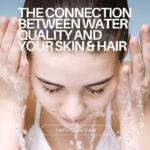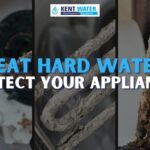Ensuring the quality of the water we drink and use in our households is a topic that concerns us all. But what exactly is meant by “quality”? Whether you receive city or well water, water quality is influenced by multiple factors, one of the most significant being its hardness. Although it is safe to drink, hard water’s active properties can lead to subtle yet long-lasting effects on your living environment and health. In this article, we will explore how identifying these hidden effects can help adopt sustainable measures to mitigate their impact.
What is Hard Water?
Water, as it moves through the ground, dissolves and filters through rocks and sediments that contain large amounts of calcium and magnesium carbonates, resulting in high mineral content known as “hard water”. Typically, hard water is measured by more than 120 parts per million (ppm), or .120 grams of minerals per liter. The higher the concentration of these minerals, the harder the water is, and approximately 85% of Canadian households receive it through their taps.
While drinking hard water is beneficial in providing us with needed calcium and magnesium, it has a direct impact on our everyday lives. Let’s take a look at how it affects us.
The Invisible Consequences of Hard Water: Limescale, the Plumbing and Appliances Enemy
Most people are familiar with limescale, the chalky, crusty buildup caused by the crystallization of hard water minerals, which can be seen on surfaces that frequently come into contact with water: kettles, coffee makers, faucets, sinks, showers and bathtubs, and toilet basins.
However, the damaging effects of hard water are not just limited to visible limescale: hard water basically deposits limescale everywhere it passes through your plumbing and appliances, which can cause serious issues. Mineral buildup accumulates in pipes and fixtures, obstructing water flow, thus lowering water pressure, and causing corrosion. Water-using appliances, such as dishwashers, laundry machines, fridges, and water heaters, are particularly susceptible to scaling, which can reduce their efficiency and lifespan. For example, a water heater must work twice as hard to heat water and mineral scale buildup inside the tank!
Subsequently, you might use more water than necessary, and not notice that your appliances compensate for the loss of efficiency by consuming a high level of energy.
In brief, hard water can increase energy and water bills, require expensive repairs and maintenance, and create significant environmental impacts.
The Conflicting Relationship Between Hard Water, Soap, and Detergent
Limescale is not the only inconvenience caused by hard water. Coming into contact with soap, it results in soap scum buildup. To explain briefly, the minerals present in hard water prevent soap from dissolving, leading to reduced soap cleansing abilities. Instead of emulsifying a foamy lather that can easily be rinsed away, soap scum forms a layer of concrete scaliness that aggregates over bathroom surfaces.
The same principle and effects apply to detergents. As a result, even with the best cleaners, the buildup is challenging to remove, giving free rein to the proliferation of fungi, and bacteria. Adding to the issue, soap scum is also responsible for the white drops or spots on the dishes coming from your dishwasher.
Consequently, as hard water inhibits cleaning effectiveness, you ineluctably use and waste more soap and detergent, as well as precious time and effort spent scrubbing to get rid of the residues. Ultimately, the supply budget is higher than it should be, and our habits negatively impact the environment once again.
A Hard Time for Your Clothes, Skin, and Hair
Unfortunately, hard water affects your laundry as well: the deposit of minerals turns your clothes to feel rough like sandpaper, and scratchy. Moreover, the soap does not dissolve properly either, leading to poor cleaning and disinfection. Over time, your clothes lose color, become dingy, and fabrics are quickly worn out, worsened by the fact you may use more soap and even chemical softeners, known to be irritating to your skin.
Speaking about dermatology, hard water also leaves soap and shampoo film on your skin and hair, making it difficult to clean and clogging pores and scales. While absorbing oil and moisture, soap scum turns out your skin to be dry, itchy, and prone to eczema. Your hair may become dry, brittle, dull, thinner, and lifeless. Want to know more about it? Feel free to read our article here.
Water Softeners: a Solution to Beat Hardness
As we can see, hard water can have many harmful effects on our daily lives and health. Fortunately, soft water, enabled by water softeners, can eliminate these negative impacts and make them a thing of the past.
How Does it Work?
Water softeners work by removing the minerals and contaminants that cause water to become hard, by exchanging or negating calcium and magnesium ions.
Different technologies are available to improve your household water quality, most of them being salt-based water softeners, which use a combination of salt and water to remove the minerals thanks to a brine tank.
Kent Water offers a wide range of patented technologies, such as:
- Kent DropPro Connect, a smart system designed to use up to 25% less salt and water than older water softeners, by monitoring your water usage and only regenerating when necessary;
- Kent 5.0 Duplex Tanks System, Kent 4.0 High-Efficiency Water Softener, and other solutions designed to reduce water volume and salt usage per regeneration, thanks to an intelligent metering process paired with up-flow regeneration.
To be practical, investing in a sustainable Water Treatment Solution can help you extend the lifespan of your plumbing and appliances, save money, energy, and time, improve your health, keep your favorite clothes, and save the planet, too. Not bad, isn’t it?
Our experts are here to guide you to choose the perfect fit for your household and enjoy all the benefits of high-quality water.
Feel free to visit our website or contact us for advice, book a free water test, and make a change for your well-being and a better future!



